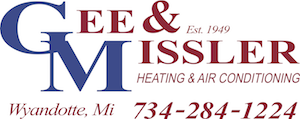
If you’re shopping for an air purifier, you could be realizing that some manufacturers are making many claims. And many of those claims may feel too good to be true. So, it’s only typical that you may be wondering are air purifiers a waste of money.
They’re worthwhile, according to the EPA, as they’re an excellent way to enhance your Wyandotte house’s indoor air quality. Newer residences are solidly sealed and deeply insulated, which is excellent for energy efficiency, but not so good for indoor air quality.
As updated houses don’t typically let in as much outside air as older homes, pollutants like dust, pet dander and cleaning products can build up inside. The result? Air that’s more polluted than the outdoors, which is a problem if you have allergies, asthma or are sensitive to respiratory irritation.
Our indoor air quality pros at Gee & Missler Heating & Air Conditioning can help you cut through the clutter and choose the best home air purifier. Just give us a call at 734-284-1224 and we’ll be happy to provide support. Meanwhile, learn more about how air purifiers work, their perks and our recommendations to help you find the best air purifier.
How Do Air Purifiers Work?
Most home air purifiers rely on a fan to pull in air. Then, the air moves through one or more filters to catch pollutants before being sent out again.
These filters can incorporate a charcoal filter, to remove odors, and a HEPA, or high efficiency particulate air, filter. A HEPA filter is at least 99.7% effective at catching miniscule particles down to .3 microns, such as dust, pollen, mold and some bacteria.
An air purifier can be movable and used to filter one area. Or they can be added to your HVAC system, giving effective filtration for your total house.
The EPA says it’s important to know that air purifiers can’t eliminate all the contaminants from your house’s air. But when used in tandem with a better filter for your HVAC system, they can greatly reduce the concentration of indoor air pollution.
4 Advantages of Air Purification
Adding an air purifier to your house can deliver many good health perks. Here are just a couple of them.
1. Lowers Allergy and Asthma Triggers
Air purifiers decrease contaminants in your house, including some of these standard triggers:
- Dust
- Pollen
- Mold
- Volatile organic compounds, including cleaners, air fresheners and personal care products
2. Alleviates Other Symptoms Associated with Poor Indoor Air Quality
Even if you or someone in your household doesn’t experience allergies or asthma, an air purifier can lower other symptoms related to poor indoor air quality. These entail:
- Dry throat, eyes, nose or skin
- Headaches
- Sneezing and coughing
- Fatigue
- Dizziness
- Nausea
It can be hard to determine issues related to indoor air quality, as they can be triggered by many other illnesses. However, if you’re aware that symptoms are better after you leave your residence, your indoor air quality is possibly causing a problem.
3. Gets Rid of Odors
Persistent odors, like cigarette smoke or cooking smells, can be tough to get rid of. If you are having a hard time with removing heavy smells in your house, we recommend buying an air purifier with a charcoal or activated carbon filter.
4. Might Reduce Your Probability of Getting Sick
An air purifier can eliminate some bacteria and viruses under certain airflow conditions, keeping you and your family in better health even more so during winter months. To take full advantage of this benefit, our pros advise a UV air purifier. Disinfecting ultraviolet light delivers an extra layer of protection against airborne pathogens.
Air Purifiers to Stay Away From
You’re better off without select air purifiers. Here are a couple of options to avoid when selecting a system for your house:
- Makes ozone. Some air purifiers make ozone, which can aggravate your lungs. The EPA recommends skipping ozone air purifiers.
- Doesn’t use HEPA filters. For the best results, you’ll want a HEPA air purifier. Regarded as the gold standard for pure air, HEPA filters are used in many healthcare settings, such as hospitals.
- Only purifies a single room. We advise getting a whole-house air purifier, which cleans the air in every room. This style works alongside your heating and cooling system.
When you work with the indoor air quality experts at Gee & Missler Heating & Air Conditioning, we make it easy to choose the best air purifier for your home. Give us a call at 734-284-1224 to begin breathing cleaner air today!


